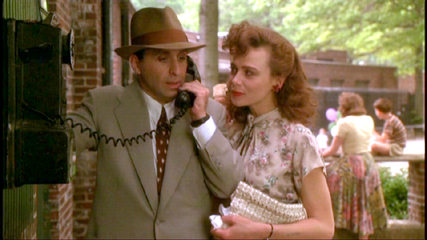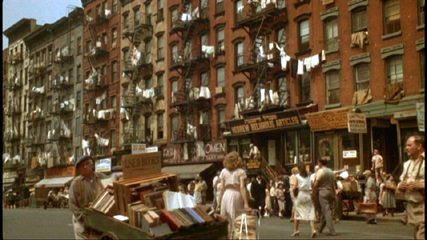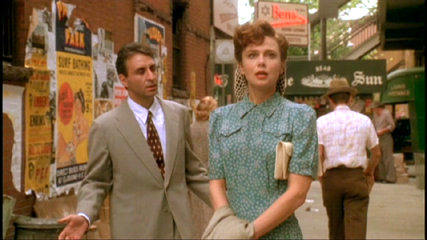|
||||||||||||||||||||||||||||||
|
Scoop's notes It's possible to construct an argument that Enemies: a Love Story should have won the Best Picture Oscar in 1989. It is not at all unreasonable to say that it is a better film than the winner! Of course, the argument is a false one because even if you agree that Enemies is a better film than Driving Miss Daisy, it's difficult if not impossible to argue that Driving Miss Daisy was really a deserving winner. Driving Miss Daisy may not be the worst film ever to win an Oscar, but then again it may be. It is certainly among the worst. (Here are my thoughts on that topic.) 1989 was one of those crazy years when the Academy got just about everything wrong with their award nominations. It wasn't a great year to begin with, but they nominated the wrong films and picked one of the weaker movies from those nominees!
There are currently nine other major 1989 films rated higher than Driving Miss Daisy. Five of them are rated higher than ALL of the Oscar nominees. In other words, it is very reasonable to argue that NONE of the Oscar nominees belonged on the list in hindsight. Certainly Glory and Henry V and Do the Right Thing should have been on the list of nominees, replacing Driving Miss Daisy, Field of Dreams, and Fourth of July. You could debate endlessly about the remaining two choices, because there are several to choose from, including the two actual nominees.
Enemies probably isn't a legitimate candidate to be the best film of that year, but it is a very good film, of the type that the critics would call "carefully observed," with rich period details, clever but unobtrusive literary constructs, and fully developed characters. It was based on a source novel by the 1978 Nobel laureate in literature, Isaac Bashevis Singer, and many people had it on their Best Picture short list for an Oscar nomination. It was nominated for a "best adapted screenplay" Oscar. Writer/director/actor Paul Mazursky actually received the New York Film critics award as the best director of 1989, and the following gallery demonstrates one of the reasons: the attention paid to the proper representation of both atmosphere and period:
I agree with Tuna's assessment of the four main characters in Enemies. It is not really possible to relate to any of them for the reasons he stated above. And yet the film works for me, even though it did not for Tuna, because I can easily identify with the plight of the trigamist. He thought his first wife had been killed by the Nazis, so he married the brave, simple-minded peasant girl who hid him from the Nazis and fed him for three years, while enduring physical hardships of her own to do so. He owed her everything, and he paid his debt fairly, resolving to care for her forever. And it wasn't such a bad deal. She was a sweet, warm and grateful person, and somewhat attractive, if unglamorous. She even became a Jew for him - a better Jew than he was! ... so if I had been in his shoes, I would have done the same thing and married her. But there was a problem. She wasn't merely unsophisticated. She was so dumb that she couldn't even put her shoes on the correct feet. ... so I guess if I had been in her shoes, I would have been walking kinda funny. He was an educated man who was curious about the world, so he sought a sophisticated woman as a mistress because he wanted the combination of mental and physical companionship. ... so if I had been in his shoes, I would have done the same thing. And then it turned out that his European wife survived the Nazi firing squad. He had no control over that, or over the fact that she found him seven years later. Something like that could have happened to any one of us who lived in those days, given the insanity of that war. So what was he to do? The film places us in the situation, gets us thinking about what is right, and gets us curious about how Herman will escape his dilemma (trilemma?). The circumstances were not highly probable, but they were possible, and I absolutely got involved in thinking about that moral question, even though Ron Silver, as always, played the part as if he needed to be bitch-slapped. Silver's on-screen persona must rival James Spader's as the one who most deserves to be beaten severely about the head and face. SPOILERS: The film has a strange ending, but it is appropriate, if unsatisfying. When Herman will not commit to run away with the glamorous intellectual mistress because he can't abandon the peasant girl, the sexy mistress descends into mental illness and commits suicide. The peasant girl gets pregnant, and Herman deserts her. This would be heartbreaking, because she seems like the best human being in the film, and doesn't seem capable of taking care of herself, let alone her baby, but her problem has a solution. The competent and commanding wife from Poland turns out to be tough and stalwart. The peasant girl had been her servant back in Poland as well as Herman's, so the two women simply resume their mistress/dependent roles from the old country and raise the baby together. And Herman? He simply disappears. Even though this is his story and the entire film is seen through his eyes until the last five minutes, he is absent when the curtain finally falls. Nobody even knows where he is. That seems like sloppy writing until one considers it fully and realizes that it is only fitting because in a way he had really always been just a bit player in his own life, and his absence would scarcely be missed. |
||||||||||||||||||||||||||||||
|
||||||||||||||||||||||||||||||




